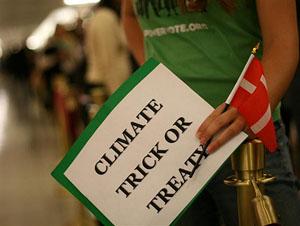The economics of the climate bill
A line formed outside Senate office buildings for the climate bill’s first hearing. (Image: flickr user: Campus Progress (cc: by-sa))
The following is a partial transcript; for full story, listen to audio.
The bill before the US Senate could have major impacts on our economy, whether positive or negative depends on who’s talking. Industry groups tout studies warning of steep jobs losses due to higher energy prices. Environmental groups counter with analyses that show a bonanza of new, green jobs.
To put those predictions in context are two economists on either side of the debate.
The first is University of Massachusetts Amherst Professor Robert Pollin. His Political Economy Research Institute produced a study that predicted 1.7 million new, clean energy jobs.
“Well, the basic factors generating the net expansion of jobs is very straightforward,” said Pollin. “There’s two considerations: one, in moving from a fossil fuel-based economy to a clean energy economy, we need to hire more people. There’s more people involved in building the clean energy economy as opposed to maintaining the fossil fuel economy – that’s number one; and number two is the economic activity that takes place in constructing a new clean energy economy is concentrated in the U.S., as opposed to spending a lot of our money on energy abroad as we do now, by importing oil.”
The assumptions in Pollin’s model involve 70 percent of spending going into energy efficiency, which lowers energy costs and creates jobs.
But, analysis released by the Congressional Budget Office predicts significant job losses .
“Aggregate performance, the fact that jobs turn up somewhere else for some people, does not mean that there aren’t substantial costs born by people, communities, firms, and effected industries in effected areas,” CBO director Douglas Elmendorf told a Senate panel last month.
This is to be expected, says Pollin, as 3.5 million jobs are connected, directly and indirectly, to the fossil fuel sector.
“Now, given that, it’s very important that the Waxman-Markey bill that passed the House of Representatives, and the equivalent measure that’s being considered now in the Senate, includes quite considerable funds to support communities and workers that are going to have to go through a transition out of fossil fuels and into something else. Now, having said that while there are going to certainly be losses, the point that I’m making overall is that there is going to be a transition, but overall there’s going more employment in the end, and in the transition.”
Pollin says even the pessimistic studies still show no significant decline in economic growth in the long-term.
But, David Montgomery is one of those pessimists, as Vice President of Charles River Associates, he’s done economic analyses of climate legislation for industry and business groups.
“When we looked at the climate bills,” said Montgomery, “we found that they are likely to have a cost to the U.S. economy; that the cost could be substantial — in the range in 2020 between $600 per household and $1,600 per household — growing after that, but also that those costs are very uncertain.
“We concluded that there would be a loss of about two million jobs, ten or 15 years into the program compared to what the economy would be performing at otherwise.”
Montgomery’s assessment takes into consideration the lag time between when energy bill investments are made, and when jobs would actually be created by those investments. And, unlike Pollin, he doesn’t see a net gain in the end.
“Ultimately, the economy will make a transition to a different structure of employment with lower wages than there would have been otherwise, and with opportunities for people to get back to work, but even after that transition they will be earning lower incomes than they were to begin with. And there will not be more jobs, there will be fewer jobs.”
He adds that substituting cheaper, imported energy with more expensive domestic energy won’t get us ahead.
Charles River Associates has come under fire for exaggerating costs of climate legislation. Reports showing large green job growth, like Robert Pollin’s draw criticism for an oversimplified economic model.
But these economists did reach one interesting area of agreement: That there are a lot of uncertainties.
David Montgomery: “The fact is that what a cap and trade bill is going to costs us is something that policymakers cannot know when they vote for it. Because it all depends on future developments in technology, on future developments in the economy, on what other countries decide to do, and there is no way we can predict all of those things.”
Robert Pollin: “Nobody forecasted this recession, even after the recession had already started, the best econometric models still weren’t even forecasting a recession while we were in the recession. So, that shows you that forecasting models have got a long way to go before they can even be as good as forecasting the weather, for example.”
So, no matter how many economic projections lawmakers get, they will eventually have to decide climate change policy in the face of uncertainty. That, at least, is certain.
Hosted by Steve Curwood, “Living on Earth” is an award-winning environmental news program that delves into the leading issues affecting the world we inhabit. More “Living on Earth.”
